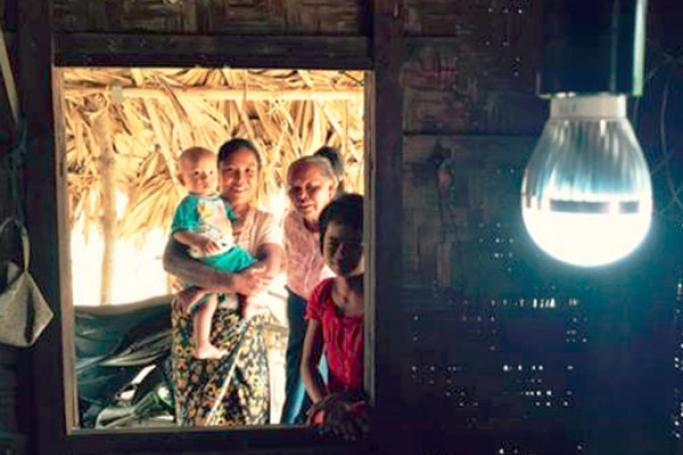Initiated one year ago, coinciding with the landing of revolutionary solar airplane Solar Impulse in Myanmar, a community solar project is now enabling communities to take off in their own ways, leading global technology company ABB said in a recent statement.
Solar Impulse landed in Mandalay, Myanmar a year ago, demonstrating that much is achievable when it comes to pioneering technology as well as harnessing the potential of clean and renewable energy. To unlock the benefits of solar power on the ground, ABB embarked on a solar project with Pact Myanmar to make a difference to thousands of villagers living in Mandalay.
Now that Solar Impulse has resumed its round-the-world flight, how has life in these villages changed?
In Myanmar, only about 1 in 3 people has access to electricity, and the numbers are even lower in small and remote villages that are located away from the grid. Accelerating electrification is key to powering a growing economy and raising the rural population out of poverty.
Since March 2015, the collaboration between ABB and Pact Myanmar has provided electricity from solar energy to more than 3,600 people across some 20 villages in Mandalay, and a basis to raise funds for village development.
Daw Lwin Mar Myint from Wun Pa Tae village in rural Myanmar, used to worry about poisonous animal bites when she wakes up in the early morning to prepare for work in the fields. Today in her village, thanks to solar power, she feels like she is walking in a brightly lit city at night.
“We now have light at night thanks to electricity from solar power. This is very important for our children’s education, as students can now study their literatures at night,” commented Daw Maw Lay from KyaungKone village.
Demonstrating solar charging stations at Ye Htwet Kyi village. Photo: Pact Myanmar. The charging stations, which charge special batteries for household lighting and mobile device charging, are run by women’s empowerment groups, where women have been trained to maintain solar equipment and manage ‘charging businesses’. These businesses collect a monthly fee of around US$1 for each household battery charged. The proceeds are then accumulated in a central fund for loans.
Community sensitization workshop at Inn Latt village to collect interest and introduce different types of solar home systems. Photo: Pact Myanmar
The project also provides financial support for villages to purchase photovoltaic equipment at the community level through hire-purchase schemes. Through community sensitization workshops, the villagers are introduced to different types of solar home systems that correspond to their electricity requirements and financial ability, and receive training on loan repayment finances.
Despite floods in Myanmar which impeded the project work, the project has gained active participation and engagement at the community level. Interest earned from solar charging fees and hire-purchase schemes have been channelled to village funds to subsidize poorer households and provide light for community areas such as libraries and schools, generating development assistance that can grow and sustain itself over time.
In addition, the initial success of the project has also sparked funding from other corporate donors to invest in access to energy programs and social enterprise development, helping to scale up the efforts of Pact Myanmar to improve the quality of life in rural communities.
This is one of the latest projects in ABB’s Access to Electricity rural electrification program, with similar rural electrification projects in India and Tanzania. The program was developed as a response to the United Nations Global Compact which urged companies and organizations to provide greater assistance to least developed countries. ABB was one of the first international companies to sign on to the Global Compact after it was launched by previous UN secretary general Kofi Annan in 2000.
You are viewing the old site.
Please update your bookmark to https://eng.mizzima.com.
Mizzima Weekly Magazine Issue...
14 December 2023
Spring Revolution Daily News f...
13 December 2023
New UK Burma sanctions welcome...
13 December 2023
Spring Revolution Daily News f...
12 December 2023
Spring Revolution Daily News f...
11 December 2023
Spring Revolution Daily News f...
08 December 2023
Spring Revolution Daily News f...
07 December 2023
Diaspora journalists increasin...
07 December 2023
Voting demonstration held in Nay Pyi Taw












